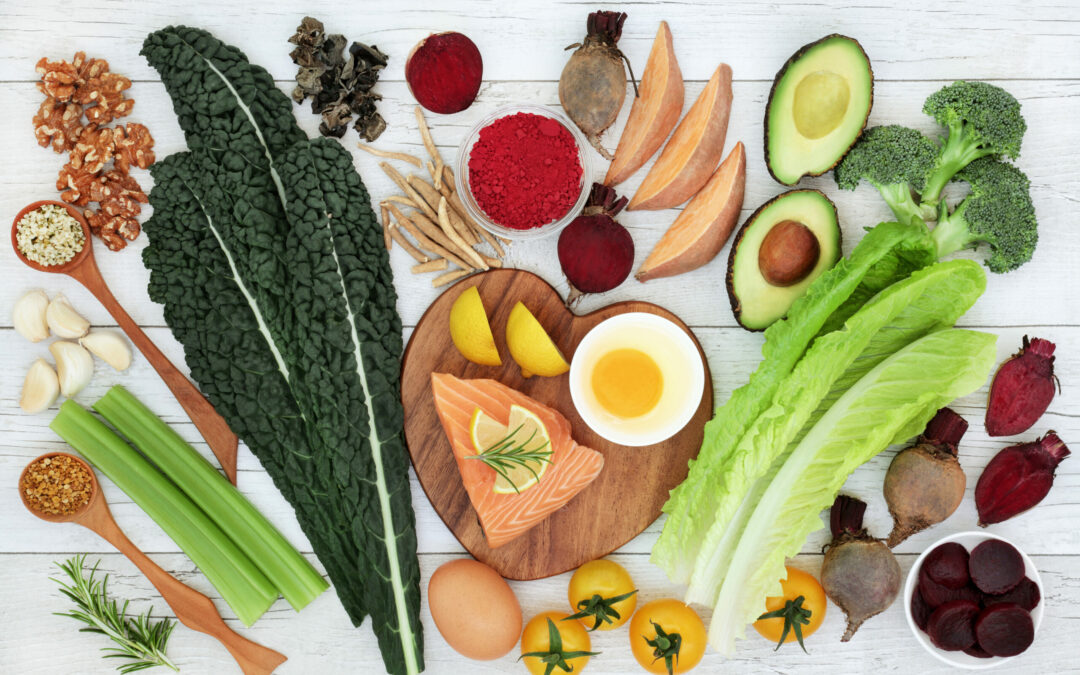Mindful Eating for Your Brain
Harkening back to ancient civilizations, the concept of food as medicine represents one of today’s most cutting-edge approaches to prevention and disease management. Inspired by the intricate connection of mind and body wellness, a small, special group of diets have made their way into the mainstream offering benefits far beyond short-term weight loss. Among them are DASH (Dietary Approaches to Stop Hypertension), a low-sodium diet that encourages consumption of foods rich in nutrients such as potassium and calcium and magnesium; the Mediterranean diet for heart health, emphasizing fish, fruits, and vegetables, with olive oil as the main source of fat; and combining both, the MIND (Mediterranean-DASH Intervention for Neurodegenerative Delay) diet, which shows real promise in helping its adherents preserve cognition and reduce the risk of dementia.
Launched in 2015 by researchers at Rush University Medical Center, the MIND diet encourages selecting foods from categories that include leafy greens and vegetables, legumes, fish and seafood, poultry, nuts and berries, while limiting high fat, high sugar and processed foods. Longitudinal observational studies showed the rewards of shifting to this healthier way of eating, with a 53% reduction in the risk of dementia for seniors who rigorously followed the diet, and somewhat surprisingly, a 35% risk reduction even for those who followed it only moderately well.
“This is my favorite feature,” says Jennifer Ventrelle, MS, RD, lead dietitian for the MIND Diet Intervention to Prevent Alzheimer’s Disease at Rush, “you don’t have to be perfect! It’s not necessary to eat from every preferred category to achieve your goals.”
Although it’s not intended as a reducing diet, Ventrelle says people who follow it naturally lose weight by focusing on the preferred categories of foods. “It’s too difficult for many people to consider banishing all sweets or giving up red meat forever, so we haven’t eliminated these foods but allow them with limited frequency and close attention to portion sizes,” she explains.
Additional research pointed to a host of other benefits associated with eating MINDfully for older adults: slower cognitive decline and progression of Parkinsonian signs in aging, and reduced risk of functional disability, depressive symptoms, metabolic syndrome, cardiovascular disease and all-cause mortality. “The literature continues to grow, with new studies that point to the key role diet plays in preventing cognitive decline,” says Puja Agarwal, PhD, nutritional epidemiologist and assistant professor of internal medicine at Rush.
But it is the gold-standard randomized controlled trial begun several years ago by Rush and Harvard School of Public Health that may ultimately establish a causal relationship between diet and dementia. More than 600 participants at higher risk for Alzheimer’s disease – overweight, suboptimal diets and a history of dementia in the family – were enrolled in the study designed to directly measure whether following the MIND diet versus a low-fat diet can prevent neurodegenerative ills – results are expected by the end of 2022. According to Agarwal, who is fully aware of its significance at a time when more than 6 million people in the U.S. are living with Alzheimer’s disease, a number expected to double in the coming decades. “We don’t have a cure for these diseases, so prevention strategies are essential. We’re hoping for intervention trial results for the effect of MIND diet in protecting the brain to further establish the role of diet in healthy aging.”
What a day of meals on the MIND diet might include*:
BREAKFAST
Greek Yogurt Parfait: ½ cup whole grain, high fiber cereal, ½ cup berries, ½ cup low-fat Greek yogurt, 2 tbsps (raw, unsalted) walnuts, almonds or pecans.
LUNCH
Whole Wheat Turkey Wrap: 1 tortilla wrap + 3-5 oz turkey breast lunchmeat or carved white meat + 1 slice reduced fat cheese + lettuce, tomato and veggies of choice.
3-Bean Salad: Mixture of kidney beans, black beans, chickpeas, red onions + 1 tbsp extra-virgin olive oil + 1 tsp balsamic vinegar + Italian seasoning mix such as oregano, parsley, basil, etc.
SNACK
Mediterranean Rice Cake: 1 whole grain rice cake spread with 2 tbsps hummus topped with cucumber slices, tomato slices + fresh lemon juice.
DINNER
Baked Salmon over Spinach and Grains with Asparagus
- 3-5 oz salmon filet topped with fresh or dried dill or parsley + a squeeze of fresh lemon juice baked on top of 1 cup baby spinach leaves
- 8 asparagus spears topped with ½ tbsp extra-virgin olive oil + fresh lemon juice + zest
- 1 cup cooked whole grain such as brown rice, quinoa, or bulgur mixed with ½ tbsp. extra-virgin olive oil
DESSERT
1 oz of dark chocolate (at least 75% cocoa) and ½ cup frozen berries
*Please consult with your physician to determine if these foods are appropriate for you.


